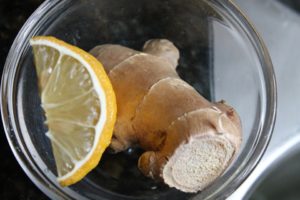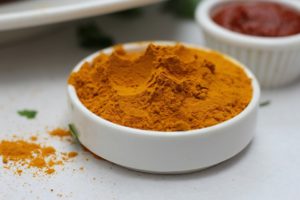Disclosure: This article may contain affiliate links. If you decide to make a purchase, I may make a small commission at no extra cost to you.
One of my favorite drinks to have is turmeric and ginger tea. It’s as simple as it sounds: you add ginger and turmeric in a cup of boiled water.
The combination of turmeric and ginger makes it a powerful drink that has numerous health benefits in preventing and even possibly treating a variety of different illnesses.
Both of these spices are commonly used in foods and are cultivated from southeast Asia, India, and China. In the west, spices like turmeric are typically consumed in foods such as curry.
The combination of these two spices creates a soothing, yet slightly zingy flavor, which can be enjoyed throughout the day to get the most benefit. I will often add turmeric and ginger to my morning green tea as well, as they taste very nice together and green tea has its own unique benefits.
I learned many years ago that Okinawan centenarians would often drink turmeric tea before bedtime, which may account for their very low rates of cancer and other diseases.
It’s good daily habits like these over a long period of time which can really make a difference to your health and ultimately your lifespan.
If you don’t fancy drinking turmeric and ginger tea by the end of this article, be sure to check out my recommended ginger and turmeric supplements. They also contain Bioperine, which can significantly enhance the absorption of curcumin found in turmeric.
The main health benefits of Turmeric and Ginger tea
Turmeric and Ginger belong to the same family but provide different health benefits. Below are some of the main ones:
- Relieves inflammatory conditions such as arthritis.
- Protects against certain types of cancer.
- Help with gallstones.
- Improves digestion.
- Strengthens and balances the immune system.
- Kills parasites.
- Antibacterial and antiviral.
- Improves blood glucose.
- May improve cognition.
- Good for heart health.
- Improves common skin complaints.
- Improves healing.
- Good antioxidant.
- Relieves motion sickness and acts as an antiemetic.
The list of benefits from these amazing herbs keeps growing as we gather more scientific data to back up all of the anecdotal evidence from the past. Below are some of the conditions which have been studied the most.
#1. Arthritis
Turmeric has long been known to ease the pain and swelling associated with arthritis. Recent studies have confirmed the beneficial effects of taking turmeric or curcumin extract supplements in helping reduce levels of pain and swelling.
Rheumatoid arthritis: In one study, researchers found curcumin to be effective in improving tenderness, swelling of joints and decreasing disease activity in patients taking 500 mg of curcumin [1].
Osteoarthritis: Fifty patients who took a complex of curcumin (found in turmeric) with soy phosphatidylcholine for osteoarthritis, found that their symptoms decreased in severity and they were able to walk further on a treadmill test. Measurements of inflammatory markers were decreased [2].
In animal studies, curcumin has been shown to even slow the progress of osteoarthritis, showing that even if you do suffer from it, it is possible to slow down its progression [3].
Extracts of ginger have also been used in the treatment of osteoarthritis and provided moderate improvements in symptoms [4].
#2. Cancer
In recent years there have been a lot of anecdotal reports of people using turmeric to help them treat various types of cancer from blood cancer to colon cancer. And there may be some truth behind these claims.
Curcumin, although poorly absorbed by the body, is able to reach a concentration in the body which can be effective in causing cancer cells to self-destruct.
Another benefit is that curcumin is able to stimulate the immune system to detect and destroy the cancer cells.
A study from 2001 showed that taking curcumin may reduce the likelihood of precancerous cells turning malignant. Patients took between 500 mg to 800 mg of curcumin per day. The results of the study were mixed, but in some patients, they reported improvements in precancerous lesions [4].
In another study, also conducted in 2001, patients who did not respond to the standard cancer protocol with chemotherapy were enrolled in a study using curcumin to treat their colon cancer.
Out of fifteen patients, the disease was stable for five patients for 2 – 4 months of treatment. The dose given to patients was equivalent to 180 mg of curcumin.
Ginger has been shown in both in vitro and animal studies to have some anticancer effects against breast cancer, pancreatic cancer, and ovarian cancer, however, more research is needed to confirm these findings in humans.
Cognitive improvement
There is some evidence that curcumin found in turmeric may enhance the ability of the immune cells to clear plaque build up in the brain, helping reduce symptoms associated with Alzheimer’s disease. Another mechanism by which curcumin may help is through its anti-inflammatory effect.
One recent study looked at the effect of curcumin in 40 patients over a period of 18 months. The results were impressive: in the group taking curcumin, the researchers reported a 28 percent improvement in memory tests.
The group also experienced an improvement in mood and their PET brain scans showed less amyloid and tau signals than those who took the placebo. This is important because it could show that if curcumin is taken long-term, and early enough, it may slow or even prevent Alzheimer’s disease.
The anti-inflammatory effect on the brain could be one of the reasons for its antidepressive effects also. People with depression tend to have higher levels of brain inflammation.
Turmerics ability to boost BDNF, as well as neurotransmitters such as serotonin and dopamine may also explain its protective effect against depression.
In this randomized controlled trial, researchers showed that curcumin was just as effective at treating major depressive disorder as medication [5].
Ginger also has its benefits when it comes to cognitive function. In a study published in 2011, they found that middle-aged women who took 400 and 800 mg doses of ginger for 2 months had experienced an improvement in working memory.
The main bioactive compounds in ginger and turmeric responsible for its health benefits
Ginger

Ginger compromises of many different compounds which are thought to have biological activities when consumed. The main compounds of ginger which are thought to affect human health include the following:
Gingerol and gingerol-related compounds
Gingerols are one of the main active compounds found in ginger and have been extensively studied compared to the other compounds.
Gingerols have been found to possess many benefits such as antitumor activity, anti-inflammatory, anti-nausea, antibacterial activities, and also protects the liver.
Paradol
Paradol has anti-cancer benefits as well as being antibacterial and acts as an antioxidant.
Paradol has also been investigated in animal models for its effect on thermogenesis by activating brown adipose tissue, which may help with weight loss.
Shogoal
Acts as an antioxidant as well as showing potent anticancer activities by inhibiting cell invasion, reducing cell proliferation, and reducing MMP enzymes.
Other bioactive compounds in ginger: zingerone, zerumbone, 1-Dehydro-(10)-gingerdione, terpenoids, and ginger flavonoids.
Turmeric

Turmeric, the bright yellow spice which is mainly cultivated in India, has one very widely studied compound called curcumin.
The yellow color of turmeric is because of the presence of three curcuminoids and are used in many areas of cosmetics, food additives, dyes, medicines, and more.
Curcumin
The amount of curcumin you can get from turmeric powder varies, but turmeric contains around 2% curcumin by weight. In one tablespoon of turmeric, you will get about 136 mg of curcumin. Doses of up to 8000 mg of curcumin have been shown to be safe taking long term [6].
Benefits of curcumin:
- Powerful anti-inflammatory.
- Neutralizes free-radical damage.
- Curcumin may increase neurogenesis in the brain by increasing levels of BDNF.
- Provides benefits for osteoarthritis and rheumatoid arthritis.
- Protects against cardiovascular disease.
- May prevent and treat certain cancers according to clinical trials which have been conducted.
Tip: Using black pepper with curcumin can enhance the absorption of curcumin in the body.









